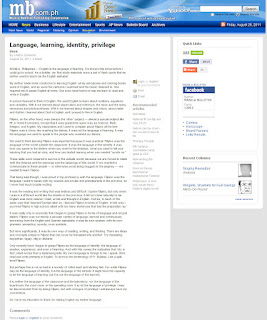Last June, my niece started pre-school in a Montessori school located at one of the more affluent neighborhoods near our house. I chose that school because it made a good impression on me and that's where I plan to send Andrea next year. My mom, my sister and I want them to go to the same school. My mom went with my niece that first day and after class, my mom called me to tell me that ALL kids in that school speaks English only. No one can speak in Filipino except my niece.
That made me think twice... thrice... several times... about whether I want to send my daughter to an environment like that. Most parents here teach their kids English first. I understand the need to learn English. English is the language most used to teach in our schools here. And when you enter the corporate workforce, command of the English language is a must with everything going global nowadays. English is a language we eventually learn. But we (my family at least) use Filipino at home. Filipino is our national language and as Filipinos, I strongly believe that we should know our own language.
For a while now, speaking English here has become a sign of belonging to the "upper class". And sometimes, this comes with arrogance that is really irritating. It has become "cool" for Filipinos to not know or worse, speak bad Filipino, and be more fluent in English. And it's sad, and annoying really, when you hear some Filipinos try to fake being bad at the Filipino language to try to appear cool. Yes, seriously, some people do that... and when you are a native Filipino speaker, you can tell. When babies are born, parents speak to their babies in English only. I have heard that in some homes, speaking in Filipino is not allowed. I do not judge those parents. They have their reasons. I just think it's sad that the new generation will never get to know the language that is part of our identity as a people. That is not how I want to raise my daughter.
Every year in August, we celebrate Buwan ng Wika (Language Month) here in the Philippines. In schools they usually have a program where children dress up in traditional Philippine costumes and recite poems or sing songs in Filipino. How ironic is it that just a few days ago, this article came out in one of the biggest newspapers here:
--do not click the link though--
--article deleted already--
I just wanted to share the original link but after getting several feedback from a lot of outraged people, the newspaper decided to pull the article. I was able to get a screenshot to share with my husband before they pulled it though.
--double click image for larger view--
--double click image for larger view--
Or you can send me an email if you want a document copy to read better.
Though some of what was said about Filipino is true (i.e. Filipino being its own system, with its own grammar, semantics, sounds, even symbols. But more significantly, it was its own way of reading, writing, and thinking. There are ideas and concepts unique to Filipino that can never be translated into another.), the general tone of the article feels wrong and elitist. My initial impression was that here is someone who wants people to think of him as elite because he speaks English. But I have read the article over and over and I give the author the benefit of the doubt. As one of my friends said in Twitter, he might be trying to elicit change in how we use and view our language. Was he trying to be sarcastic? Probably. He might not just have been able to get his message across very clearly. Benefit of the doubt. Reading the article's conclusion made my temper flare a bit again... but benefit of the doubt.
Contrary to what the author says, we don't just use Filipino because we are "forced to relate with the tinderas (Janelle: people who sell food or other small items on the street or from small neighborhood stores) and the manongs (Janelle: technically a term of respect for an older male in Bisaya, another major dialect used commonly in southern Philippines, but is also a term that has gained popularity as a generic name used to call drivers, especially public transport drivers when you don't know their names) and the katulongs (Janelle: maids, housekeepers) of this world. If we wanted to communicate to these people — or otherwise avoid being mugged on the jeepney". Or because it is the language "used to speak with my cousins and uncles and grandparents in the province". It's not merely a "street language". It's the language I use to communicate with my daughter. I call her Anak, the Filipino term for offspring derived from the Malaysian language, I think. When I want to thank someone, I say Salamat or Salamat po, Filipino for "Thank you". I add "po" at the end of my sentences as a sign of respect when I speak to my elders. Instead of "Mommy" and "Daddy", some of my friends call their parents "Nanay" and "Tatay". I talk to my friends in Filipino, and it's much more fun sharing stories this way than using English.
I do not deny the importance of the English language in our daily lives as Filipinos. We read books in English. We watch TV shows and movies in English. More reference materials are available in English than in any other language. I work for a transnational company and in the course of my work every day, I talk to my officemates located in Taiwan or Ireland or Japan or the US. We use English. As I'm sure all companies who are trying to go global. So there is truth in the author's statement that Filipino is not the "language of the classroom and the laboratory, nor the language of the boardroom, the court room, or the operating room". But this should not diminish our respect for our native language.
This last part is what must have struck a chord with a lot of the people who read this:
"I may be disconnected from my being Filipino, but with a tongue of privilege I will always have my connections. So I have my education to thank for making English my mother language."
"Tongue of privilege"... what does that even mean? And this too, "language of the learned". Too elitist. Too snobbish. And with his "tongue of privilege", he will always have his connections... to what I wonder?















































